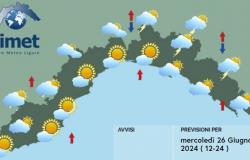Rome, 17 June – A direct attack on pharmacies, the pharmaceutical service and – consequently – citizens. This is how the pharmacists in Lazio interpret the regional law n. 9 of 5 June 2024, which also intervenes (in art. 6) to review the premium paid to pharmacies for the drug distribution service in the name and on behalf of the Regional Health Service. And he does it by holding a pair of scissors: the new value of the premium, all-inclusive, is in fact “calculated with reference to the drugs dispensed and corresponds to the average calculated on the first four values in ascending order of ‘average service cost’ of the Regions reported in the most recent annual report of the National Observatory on the use of medicines (OsMed) of the Italian Medicines Agency (Aifa)”, reads the article. Translated into simpler terms and related to the current regulatory framework of the DPC in Lazio, it means that to ensure the distribution service on behalf of the pharmacies of the Region they will be paid with a premium per package corresponding to more or less a third of that perceived today.
A draconian cut, in short, ordered unilaterally and from above, to which the pharmacies’ acronyms have not yet officially reacted, even if some personal reactions entrusted to social media by some managers are enough to make the situation clear. category (see for example the video published on Facebook by president of Fenagifar Vladimir Grieco).
But, obviously, the provision has stirred – and a lot – the waters of the Lazio pharmacies, which consider it a serious injustice: even if the Dpc of Lazio is actually the highest in Italy (as the managers themselves have no difficulty in recognizing of the owners’ unions) we must not forget that the community pharmacies of the Region virtuously contribute to the management of drug spending: from January to November 2023, as attested by the Aifa report relating to the first 11 months of last year, the affiliated pharmaceutical spending of the In fact, Lazio remained well below the ceiling assigned to it, “saving” something like 39 million euros. A healthy breath of fresh air, in a Region where the expense for the direct purchase of medicines “breaks through” the ceiling by as much as 269 million.
This means that the higher cost of the DPC (a service which, in order to be ensured – with great appreciation by citizens – involved the structuring of an organized and perfectly functioning system, with the participation of a plethora of subjects, including intermediate distributors and, indeed, pharmacies) is largely balanced by the advantages accounted for in other items.
Regional law n. 9/2024, in reality, is only the latest chapter in a now long sequel
“misunderstandings” between the regional council chaired by Francesco Rocca (in the picture) and the acronyms of local pharmacies. There are many points of friction: Lazio, despite the clear direction of the central government (of the same color as the regional one, moreover), is among the large regions the one that has the most difficulty in starting the experimentation of the ‘service pharmacy’. But that’s not all: the Region has so far also hindered in every way the passage of gliptins – the anti-diabetic drugs protagonists of the first awaited update of the Handbook of hospital-territory care continuity (Pht) – from dispensing in hospital to class A for promote access in terms of proximity through local pharmacies. An ostracism that the regional offices justify by claiming that it is not mandatory to observe the indications of the regulatory authority regarding the reclassification of Pht drugs into band A. ignoring the fact that this is an objective strongly pursued by the government and its majority.
Contradicting the same public and repeated declarations of its representatives (starting from President Rocca) on the need to encourage the transition of pharmacies towards the service model, with a view to developing local assistance, the Lazio Region has given the impression in recent times of hindering in any way the development of activities for the benefit of the citizens of these local health facilities.
Obviously, the world of pharmacies is wondering what the reasons may be for decisions that are difficult to understand and even more so to accept. Federfarma Roma, in an internal note, raises the suspicion that the Region’s strategy is actually a strategy put in place precisely to force the Region’s pharmacies to accept a very substantial cut on the current economic conditions of the DPC. In short, the reasoning would be this: you eliminate or almost eliminate the DPC remuneration and we start the “pharmacy of services”, the slipping of Pht drugs and everything else.
The problem is that the condition requested by the regional government – without having to do too many calculations – the pharmacies simply cannot accept it, for the simple reason that they cannot support it: lowering the premiums to those levels would in fact mean destroying a system laboriously put in place and decree the return to the direct distribution of those drugs that citizens (especially the elderly and chronically ill) today conveniently collect from the pharmacy near their home.
It is useless to say words about the negative consequences that this would produce in terms of inconvenience and difficulty in accessing medicines. But regional leaders would also do well to ask themselves from now on the consequences that their decision would entail in terms of loss of consensus, if they were really forced to return to the past.
The serious fact is that the Region – using among other things a regional provision which has nothing to do with the pharmacy – has nevertheless decided to cross the Rubicon of gambling and to force its hand, imposing on the pharmacies – as already reported – the devastating measure of aligning the DPC remuneration with the average of the 4 lowest commissions in Italy.
First of all, the existence of the conditions for an appeal to the TAR against the provisions of the art. 6 of regional law n. 9/2024. If the path of the “service pharmacy”, started in almost all the regions of Italy, in Lazio were to continue to remain at a standstill, the idea is to start “communication campaigns to make citizens understand how pharmacies could help them in preventing and reducing waiting listssto”.
Furthermore, the union of owners of Rome and its province writes that it will never be signed “an agreement which in a centre-right region, with a centre-right national government which brings medicines back to an agreement to recognize the proximity role of pharmacies, undermines and makes the DPC unsustainable, risking putting the distribution of medicines in many small municipalities of Lazio to the detriment of assistance to citizens”.
And, obviously, there is a reference to more drastic protest measures, the proclamation of a state of unrest and public protest demonstrations under the headquarters of the Lazio Region.
We must now understand whether the Region’s risk of forcefully decreeing a cut in the remuneration of the DPC is a slip of the foot on the clutch that has forced an unexpected (and wrong) change of gear in the management of Lazio’s pharmaceutical policies, or whether it is instead a conscious and deliberate decision, a piece of a strategy that is frankly difficult to decipher.
What is certain is that pharmacies, in recent years also marked by dramatic trials such as the pandemic, have reached the now unshakable awareness of being an indispensable support for the development of modern, sustainable and responsive local healthcare to the needs of people in the area. And strong in this awareness they will not accept measures and decisions that could jeopardize this status: “We will resist and fight by carrying forward our demands and our ideas” Cicconetti writes about it “always convinced that the pharmacy, today more than ever, is an irreplaceable element in local healthcare”.







